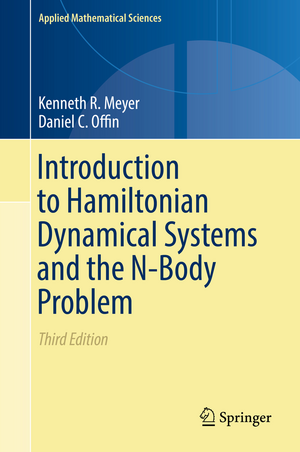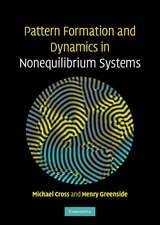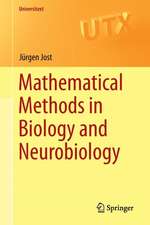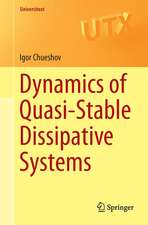Introduction to Hamiltonian Dynamical Systems and the N-Body Problem: Applied Mathematical Sciences, cartea 90
Autor Kenneth R. Meyer, Daniel C. Offinen Limba Engleză Hardback – 24 mai 2017
The previous editions grew out of graduate level courses in mathematics, engineering, and physics given at several different universities. The courses took students who had some background in differential equations and lead them through a systematic grounding in the theory of Hamiltonian mechanics from a dynamical systems point of view.
This text provides a mathematical structure of celestial mechanics ideal for beginners, and will be useful to graduate students and researchers alike.
Reviews of the second edition:
"The primary subject here is the basic theory of Hamiltonian differential equations studied from the perspective of differential dynamical systems. The N-body problem is used as the primary example of a Hamiltonian system, a touchstone for the theory as the authors develop it. This book is intended to support a first course at the graduate level for mathematics and engineering students. … It is a well-organized and accessible introduction to the subject … . This is an attractive book … ." (William J. Satzer, The Mathematical Association of America, March, 2009)
“The second edition of this text infuses new mathematical substance and relevance into an already modern classic … and is sure to excite future generations of readers. … This outstanding book can be used not only as an introductory course at the graduate level in mathematics, but also as course material for engineering graduate students. … it is an elegant and invaluable reference for mathematicians and scientists with an interest in classical and celestial mechanics, astrodynamics, physics, biology, and related fields.” (Marian Gidea, Mathematical Reviews, Issue 2010 d)
| Toate formatele și edițiile | Preț | Express |
|---|---|---|
| Paperback (1) | 493.73 lei 6-8 săpt. | |
| Springer International Publishing – 28 iul 2018 | 493.73 lei 6-8 săpt. | |
| Hardback (1) | 515.52 lei 38-45 zile | |
| Springer International Publishing – 24 mai 2017 | 515.52 lei 38-45 zile |
Din seria Applied Mathematical Sciences
- 13%
 Preț: 426.94 lei
Preț: 426.94 lei - 13%
 Preț: 426.46 lei
Preț: 426.46 lei - 13%
 Preț: 427.63 lei
Preț: 427.63 lei - 24%
 Preț: 906.78 lei
Preț: 906.78 lei - 23%
 Preț: 659.05 lei
Preț: 659.05 lei -
 Preț: 375.64 lei
Preț: 375.64 lei - 18%
 Preț: 909.47 lei
Preț: 909.47 lei - 18%
 Preț: 795.02 lei
Preț: 795.02 lei - 18%
 Preț: 950.52 lei
Preț: 950.52 lei - 15%
 Preț: 645.47 lei
Preț: 645.47 lei - 20%
 Preț: 755.46 lei
Preț: 755.46 lei -
 Preț: 382.65 lei
Preț: 382.65 lei - 24%
 Preț: 808.03 lei
Preț: 808.03 lei -
 Preț: 452.62 lei
Preț: 452.62 lei -
 Preț: 190.23 lei
Preț: 190.23 lei -
 Preț: 399.12 lei
Preț: 399.12 lei - 18%
 Preț: 966.90 lei
Preț: 966.90 lei - 15%
 Preț: 643.48 lei
Preț: 643.48 lei - 15%
 Preț: 528.80 lei
Preț: 528.80 lei -
 Preț: 413.15 lei
Preț: 413.15 lei -
 Preț: 390.25 lei
Preț: 390.25 lei - 18%
 Preț: 736.01 lei
Preț: 736.01 lei - 18%
 Preț: 1411.05 lei
Preț: 1411.05 lei - 15%
 Preț: 711.21 lei
Preț: 711.21 lei -
 Preț: 395.47 lei
Preț: 395.47 lei - 18%
 Preț: 1017.26 lei
Preț: 1017.26 lei -
 Preț: 403.15 lei
Preț: 403.15 lei - 18%
 Preț: 1130.14 lei
Preț: 1130.14 lei - 18%
 Preț: 1134.87 lei
Preț: 1134.87 lei - 18%
 Preț: 1329.00 lei
Preț: 1329.00 lei - 18%
 Preț: 1129.65 lei
Preț: 1129.65 lei - 18%
 Preț: 1140.71 lei
Preț: 1140.71 lei - 15%
 Preț: 653.14 lei
Preț: 653.14 lei
Preț: 515.52 lei
Preț vechi: 636.45 lei
-19% Nou
Puncte Express: 773
Preț estimativ în valută:
98.64€ • 102.99$ • 81.64£
98.64€ • 102.99$ • 81.64£
Carte tipărită la comandă
Livrare economică 31 martie-07 aprilie
Preluare comenzi: 021 569.72.76
Specificații
ISBN-13: 9783319536903
ISBN-10: 3319536907
Pagini: 386
Ilustrații: XIII, 384 p. 40 illus., 9 illus. in color.
Dimensiuni: 155 x 235 x 30 mm
Greutate: 0.64 kg
Ediția:3rd ed. 2017
Editura: Springer International Publishing
Colecția Springer
Seria Applied Mathematical Sciences
Locul publicării:Cham, Switzerland
ISBN-10: 3319536907
Pagini: 386
Ilustrații: XIII, 384 p. 40 illus., 9 illus. in color.
Dimensiuni: 155 x 235 x 30 mm
Greutate: 0.64 kg
Ediția:3rd ed. 2017
Editura: Springer International Publishing
Colecția Springer
Seria Applied Mathematical Sciences
Locul publicării:Cham, Switzerland
Cuprins
Beginnings.- Hamiltonian Systems.- Celestial Mechanics.- The Restricted Problem.- Topics in Linear Theory.- Local Geometric Theory.- Symplectic Geometry.- Special Coordinates.- Poincaré’s Continuation Method.- Normal Forms.- Bifurcations of Periodic Orbits.- Stability and KAM Theory.- Variational Techniques.
Recenzii
“The book begins as an elementary introduction to the theory of Hamiltonian systems, taking as a starting point Hamiltonian systems of differential equations and explaining the interesting features they have with the help of classical examples. … the book can be used at an advanced undergraduate or beginning graduate level as an introduction to these subjects, in particular when one is interested in their impact on classical (celestial) mechanics.” (Johannes Giannoulis, zbMATH 1372.70002, 2017)
Notă biografică
Ken Meyer has a long history of working in Hamiltonian differential equations and the N-body problem. He has over 100 papers published.
Daniel Offin is an active researcher in the theory of Hamiltonian systems using variational methods. He has made some important contributions to celestial mechanics using the Maslov index.
Daniel Offin is an active researcher in the theory of Hamiltonian systems using variational methods. He has made some important contributions to celestial mechanics using the Maslov index.
Textul de pe ultima copertă
This third edition text provides expanded material on the restricted three body problem and celestial mechanics. With each chapter containing new content, readers are provided with new material on reduction, orbifolds, and the regularization of the Kepler problem, all of which are provided with applications.
The previous editions grew out of graduate level courses in mathematics, engineering, and physics given at several different universities. The courses took students who had some background in differential equations and lead them through a systematic grounding in the theory of Hamiltonian mechanics from a dynamical systems point of view.
This text provides a mathematical structure of celestial mechanics ideal for beginners, and will be useful to graduate students and researchers alike.
Reviews of the second edition:
"The primary subject here is the basic theory of Hamiltonian differential equations studied from the perspective ofdifferential dynamical systems. The N-body problem is used as the primary example of a Hamiltonian system, a touchstone for the theory as the authors develop it. This book is intended to support a first course at the graduate level for mathematics and engineering students. … It is a well-organized and accessible introduction to the subject … . This is an attractive book … ." (William J. Satzer, The Mathematical Association of America, March, 2009)
“The second edition of this text infuses new mathematical substance and relevance into an already modern classic … and is sure to excite future generations of readers. … This outstanding book can be used not only as an introductory course at the graduate level in mathematics, but also as course material for engineering graduate students. … it is an elegant and invaluable reference for mathematicians and scientists with an interest in classical and celestial mechanics, astrodynamics, physics, biology, and related fields.” (Marian Gidea, Mathematical Reviews, Issue 2010 d)
The previous editions grew out of graduate level courses in mathematics, engineering, and physics given at several different universities. The courses took students who had some background in differential equations and lead them through a systematic grounding in the theory of Hamiltonian mechanics from a dynamical systems point of view.
This text provides a mathematical structure of celestial mechanics ideal for beginners, and will be useful to graduate students and researchers alike.
Reviews of the second edition:
"The primary subject here is the basic theory of Hamiltonian differential equations studied from the perspective ofdifferential dynamical systems. The N-body problem is used as the primary example of a Hamiltonian system, a touchstone for the theory as the authors develop it. This book is intended to support a first course at the graduate level for mathematics and engineering students. … It is a well-organized and accessible introduction to the subject … . This is an attractive book … ." (William J. Satzer, The Mathematical Association of America, March, 2009)
“The second edition of this text infuses new mathematical substance and relevance into an already modern classic … and is sure to excite future generations of readers. … This outstanding book can be used not only as an introductory course at the graduate level in mathematics, but also as course material for engineering graduate students. … it is an elegant and invaluable reference for mathematicians and scientists with an interest in classical and celestial mechanics, astrodynamics, physics, biology, and related fields.” (Marian Gidea, Mathematical Reviews, Issue 2010 d)
Caracteristici
Provides an introduction to an advanced area of research ideal for beginners Problems included at the end of each chapter Included topics lead to current literature and research Includes supplementary material: sn.pub/extras











